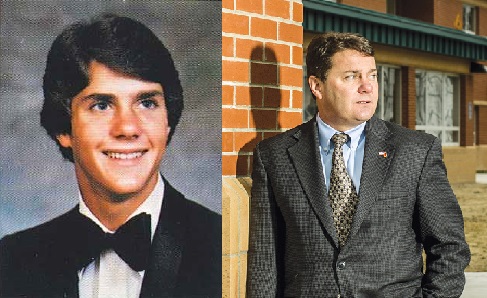Move over, McElveen. While students
across the county may rest their snow-day
dreams on FCPS’s most Twitter-savvy School
Board member, it’s actually a WS grad who is
making the call.
Jeffrey Platenberg, who is now the Assistant
Superintendent of Support Services for
all of FCPS, graduated from WS in 1979. He
took on his current job in January of 2013,
and his work encompasses a wide range of
activities, from designing new schools to
planning bus schedules. But deciding when
to cancel school is one of his most important
jobs, even if he doesn’t always get much recognition
for doing it.
“I’m the one who makes the call. And I
lose a lot of sleep… 2:45 I’ve got to be up,
because 3 o’clock we usually have a COG
call,” said Platenberg, referring to the Council
of Governments phone call in which different
local agencies discuss the weather situation
and how to handle it.
This process takes place even when the
odds of school being cancelled are almost
nonexistent, meaning Platenberg has more
sleepless nights than many FCPS students
realize. By December 2nd of this year, he’d
already had five nights where he was up looking
at road conditions and temperatures. Last
year he had to get up early over 30 times to
monitor the weather, even though only 13 of
those resulted in a day off.
“If there’s even a chance I’m doing it.
Even if I don’t call it,” said Platenberg.
Platenberg looks at road and bridge temperatures,
as well as the National Weather
Service forecast, before making a decision.
But he also checks with other counties –
Montgomery and Prince William in particular
– before making the call. Loudon County
– where Platenberg was previously Assistant
Superintendent of Support Services – often
calls and asks him for guidance. His work at
Loudon didn’t include making the actual decision
to cancel, but he was involved in the
process in a more hands-on way: plowing
snow before school.
“I used to love plowing snow, … I’d get
to meet a lot of interesting people doing it,”
said Platenburg.
After he decides, he tells Ryan McElveen
(among other school board members), who
puts the information on Twitter. He may not
be the one getting Twitter-famous, but he’s
not bothered by that.
“Everybody thinks it’s Ryan McElveen
[cancelling school],” said Platenberg. “And I
want them to think that, because he’s better
looking than me.”
But his current job doesn’t just get Platenberg
up early, it also keeps him up late, with
School Board meetings that often run until
1 AM. Being the 10th largest school district
in the country, there’s a lot to be covered
in those meetings, and while debates about
FCPS policy decisions may sound dry to
students, they can generate some real controversy
– and keep people up a little later than
they’d like in the process.
“Unfortunately, some of our school board
meetings can be rather sporting,” said Platenberg.
Platenberg’s influence on the lives of
high school students goes beyond his schoolcancellation
decisions. He is also the person
behind next year’s bell schedule, which will
have high school students coming in at 8 AM
across the county.
“That was an initiative that they handed to
me when I was first got here,” said Platenberg.
“I gave them options, and the School
Board made it successful.”
Platenberg attended WS back when Lake
Braddock was a mere six years old and South
County was still decades away from even
having blueprints drawn. One of five brothers,
he has older siblings who remember the
days of split shifts, when the school was so
overcrowded from newcomers to the region
that half the kids went to school in the morning,
and the other half went later in the day.
“There’d be a little bit of overlap,”
said Platenberg. “But they made
it [work] and it was pretty amazing,”
But despite the differences, WS still had
much of the same character that it has today.
The Lee-WS rivalry was alive and well, even
if the way it was played out was a little different.
Instead of Twitter wars and T-shirts
for football games, some WS students turned
greased pigs loose in the halls of Lee during
the school day. While Platenberg thought it
was funny at the time, looking back, he realizes
this may not have been the most ethical
use of farm animals.
“Letting pigs go and letting them run
through the hallway, that’s not good for the
pigs. Or chickens,” said Platenberg. “Somebody
let chickens go, or a goat. There was a
goat they took from a farm. It was someone’s
goat.”
But some aspects of day-to-day life at WS
were still very much the same back in the
70s. Platenberg still remembers socializing
at Senior Rail as an upperclassman, driving
scared freshmen to take alternate routes to
class. Even some of the teaching staff wasn’t
too different back in the late 70s. Platenberg
remembers math teacher by Robbie Benton,
who taught here for decades before retiring
just last year. Many current Spartans learned
Algebra 2, Precalculus, and other courses in
his classroom.
“He was a really good teacher and he
By Calvin Wilder
Oracle Editor
WS grad is behind-the-scenes on snow days
After teaching French at WS for about as long as the seniors
have been alive, French teacher Joelle Torreele is saying
au revoir.
Torreele began teaching French at age 19 without formal
education. She wasn’t thinking of teaching at that time, preferring
her watercolors to classrooms. It wasn’t until her own
children were nearing adulthood that Torreele began to seriously
consider a teaching career.
“I was fortunate enough to be a stay at home mother when
my children were small,” said Torreele. “Then, they became
teenagers and I discovered that I loved that age group – some
people called me crazy. A few years later, I got my degree
in school administration, but once again I decided that I was
happiest in the classroom.”
Torreele’s husband recently retired, and even after 48 years
of marriage, she still can’t stand to leave him every morning.
Although she planned to work for another two or three years,
her desire to spend time with her husband changed her mind.
“As far as I am concerned, I simply try to adjust psychologically
to this new phase of our life. I am in charge of planning
with a couple of main objectives: to stay productive and
to contribute more to our community,” said Torreele.
She’ll be retiring mid-year, in January, in order to make
the smoothest transition possible, and is working to make
sure her students don’t experience any jarring differences as
they become accustomed to a new teacher.
“Madame Torreele and I are working together to make
sure lessons flow seamlessly, and I take as many opportunities
as I can to meet the other students,” said Elaine Gonzalez,
WS’s other French teacher.
After January, WS would only be able to hire long-term
substitute teachers, which could be difficult for everyone:
students, teachers and administration. Regardless, Torreele is
ensuring that her students are prepared for a new experience.
“It’s going to be a little stressful, but I know that she’s
been wanting to retire and I’m happy for her,” said Katherine
Rambo, a freshman in French 1.
Torreele has the ability to explain the material without
making it overly complicated, as languages all are bound to
be.
“She cares a lot about her students and succeeding in this
class,” said Hannah Bowden, a senior in French 3.
The one thing that Torreele will not miss, however, is the
amount of time she spends teaching in comparison to the
amount of time she spends planning and performing her job
outside of the classroom.
“When I spend more time in front of my computer than
in front of my students, I know something is wrong,” said
Torreele.
takes a lot of pride in it,” said Platenberg. “If
you don’t get it, it really frustrates him.”
West Springfield hasn’t had a full renovation
since it was first opened, so that the
building itself wasn’t too different in the 70s
either. And the heating and cooling, the bane
of so many WS students’ existence, wasn’t
any less annoying back in the day.
“The heating and cooling has always been
like that,” said Platenberg. “So when you
have a moderate, or an Indian summer day,
in the springtime, boy you’re sweating… So
yeah that problem’s been going on since the
existence [of WS].”
But the facility issues didn’t keep Platenberg
from enjoying his WS experience. He’s
still involved in Spartan-run charity groups,
and he keeps in touch with students and
teachers he first met at WS.
“It’s a special place,” said Platenberg. “I
think it’s a great place, I believe in the Spartans,
I believe in the Spartan pride, and I
think it’s, I think it’s pretty awesome, and I
hope it continues.”
WS grad is behind-the-scenes on snow days

Story continues below advertisement






![“Smiles for Myles [is the idea that] happiness can be a long term thing for Myles,” said Buddies Club sponsor and disabilities teacher Madison McKenna.](https://theoracleonline.org/wp-content/uploads/2024/02/MylesArticleKeyPhoto-904x1200.jpg)
